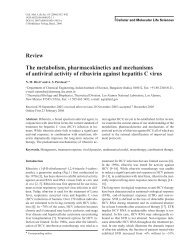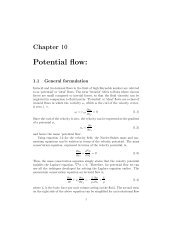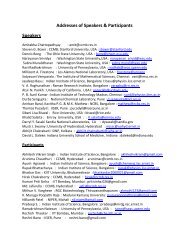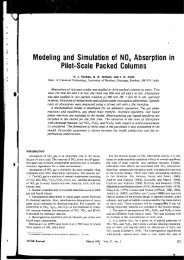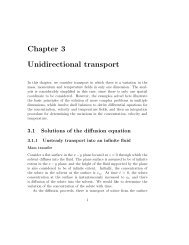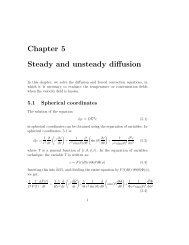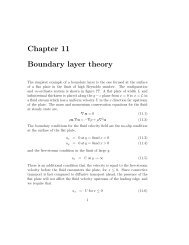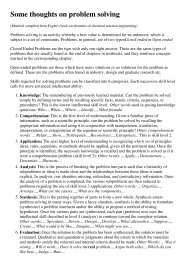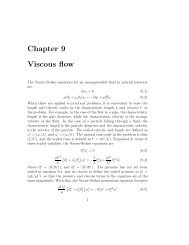Why you can't cite Wikipedia in my class - University of Hawaii
Why you can't cite Wikipedia in my class - University of Hawaii
Why you can't cite Wikipedia in my class - University of Hawaii
You also want an ePaper? Increase the reach of your titles
YUMPU automatically turns print PDFs into web optimized ePapers that Google loves.
Viewpo<strong>in</strong>t<br />
U.S., culm<strong>in</strong>at<strong>in</strong>g <strong>in</strong> a story on NBC Nightly News.<br />
Hundreds <strong>of</strong> other newspapers ran stories without<br />
<strong>in</strong>terviews, based primarily on the Times article. I<br />
received dozens <strong>of</strong> phone calls, rang<strong>in</strong>g from laudatory<br />
to actionably defamatory. A representative <strong>of</strong><br />
the Wikimedia Foundation (www.wikipedia.org), the<br />
board that controls <strong>Wikipedia</strong>, stated that he agreed<br />
with the position taken by the Middlebury history<br />
department, not<strong>in</strong>g that <strong>Wikipedia</strong> states <strong>in</strong> its<br />
guidel<strong>in</strong>es that its contents are not suitable for academic<br />
citation, because <strong>Wikipedia</strong> is, like a pr<strong>in</strong>t encyclopedia,<br />
a tertiary source. I repeated this<br />
<strong>in</strong>formation <strong>in</strong> all <strong>my</strong> subsequent <strong>in</strong>terviews, but<br />
clearly the publication <strong>of</strong> the department’s policy<br />
had hit a nerve, and many news outlets implied,<br />
erroneously, that the department was at war with<br />
<strong>Wikipedia</strong> itself, rather than with the uses to which<br />
students were putt<strong>in</strong>g it.<br />
In the wake <strong>of</strong> <strong>my</strong> allotted 15 m<strong>in</strong>utes <strong>of</strong> Andy<br />
Warhol-promised fame I have tried to figure out<br />
what all the fuss was about. There is a great deal <strong>of</strong><br />
uneas<strong>in</strong>ess about <strong>Wikipedia</strong> <strong>in</strong> the U.S., as well as <strong>in</strong><br />
the rest <strong>of</strong> the computerized world, and a great deal<br />
<strong>of</strong> passion and energy have been spent <strong>in</strong> its defense.<br />
It is clear to me that the good stuff is related to<br />
the bad stuff. <strong>Wikipedia</strong> owes its <strong>in</strong>credible growth<br />
to open-source edit<strong>in</strong>g, which is also the root <strong>of</strong> its<br />
greatest weakness. Dedicated and knowledgeable editors<br />
can and do effectively reverse the process <strong>of</strong><br />
entropy by mak<strong>in</strong>g entries better over time. Other<br />
editors, through ignorance, sloppy research, or, on<br />
occasion, malice or zeal, can and do <strong>in</strong>troduce or<br />
perpetuate errors <strong>in</strong> fact or <strong>in</strong>terpretation. The reader<br />
never knows whether the last editor was one <strong>of</strong> this<br />
latter group; most editors leave no trace save a<br />
whimsical cyber-handle.<br />
Popular entries are less subject to endur<strong>in</strong>g errors,<br />
<strong>in</strong>nocent or otherwise, than the seldom-visited ones,<br />
because, as I understand it, the frequency <strong>of</strong> visits by<br />
a <strong>Wikipedia</strong> “policeman” is largely determ<strong>in</strong>ed, once<br />
aga<strong>in</strong>, by algorithms that trace the number <strong>of</strong> hits<br />
and move the most popular sites to a higher priority.<br />
The same pr<strong>in</strong>ciple, I have come to realize, props up<br />
the whole <strong>of</strong> the Wiki-world. Once a critical mass <strong>of</strong><br />
hits is reached, Google beg<strong>in</strong>s to guide those who<br />
consulted it to <strong>Wikipedia</strong> before all else. A new button<br />
on <strong>my</strong> version <strong>of</strong> Firefox goes directly to<br />
<strong>Wikipedia</strong>. Preferential access leads to yet more hits,<br />
generat<strong>in</strong>g a still higher priority <strong>in</strong> an endless loop <strong>of</strong><br />
mutual re<strong>in</strong>forcement.<br />
It seems to me that there is a major downside to<br />
the self-re<strong>in</strong>forc<strong>in</strong>g cycle <strong>of</strong> popularity. Popularity<br />
begets ease <strong>of</strong> use, and ease <strong>of</strong> use begets the “democratization”<br />
<strong>of</strong> access to <strong>in</strong>formation. But all too<br />
<strong>of</strong>ten, democratization <strong>of</strong> access to <strong>in</strong>formation is<br />
equated with the democratization <strong>of</strong> the <strong>in</strong>formation<br />
itself, <strong>in</strong> the sense that it is subject to a vote. That<br />
last mental conflation may have orig<strong>in</strong>s that predate<br />
<strong>Wikipedia</strong> and <strong>in</strong>deed the whole <strong>of</strong> the Internet.<br />
The quiz show “Family Feud” has been a fixture<br />
<strong>of</strong> daytime television for decades and is worth a<br />
quick look. Contestants are not rewarded for guess<strong>in</strong>g<br />
the correct answer but rather for guess<strong>in</strong>g the<br />
answer that the largest number <strong>of</strong> people have chosen<br />
as the correct answer. The show must tap <strong>in</strong>to<br />
some sort <strong>of</strong> popular desire to democratize <strong>in</strong>formation.<br />
Validation is not conformity to verifiable facts<br />
or weigh<strong>in</strong>g <strong>of</strong> <strong>in</strong>terpretations and evidence but conformity<br />
to popular op<strong>in</strong>ion. Expertise plays practically<br />
no role at all.<br />
Here is where all but the most hopelessly postmodernist<br />
scholars bridle. “Family Feud” is harmless<br />
enough, but most <strong>of</strong> us believe <strong>in</strong> a real, external<br />
world <strong>in</strong> which facts exist <strong>in</strong>dependently <strong>of</strong> popular<br />
op<strong>in</strong>ion, and some <strong>in</strong>terpretations <strong>of</strong> events, thoroughly<br />
grounded <strong>in</strong> discipl<strong>in</strong>ary rigor and the weight<br />
<strong>of</strong> evidence, are at least more likely to be right than<br />
others that are not. I tell <strong>my</strong> students that <strong>Wikipedia</strong><br />
is a f<strong>in</strong>e place to search for a paper topic or beg<strong>in</strong> the<br />
research process, but it absolutely cannot serve subsequent<br />
stages <strong>of</strong> research. <strong>Wikipedia</strong> is not the direct<br />
heir to “Family Feud,” but both seem to share an<br />
element <strong>of</strong> faith—that if enough people agree on<br />
someth<strong>in</strong>g, it is most likely so.<br />
What can be done The answer depends on the<br />
goal. If it is to make <strong>Wikipedia</strong> a truly authoritative<br />
source, suitable for citation, it cannot be done for<br />
any general tertiary source, <strong>in</strong>clud<strong>in</strong>g the Encyclopaedia<br />
Britannica. For an anonymous open-source encyclopedia,<br />
that goal is theoretically, as well as<br />
16 September 2007/Vol. 50, No. 9 COMMUNICATIONS OF THE ACM




